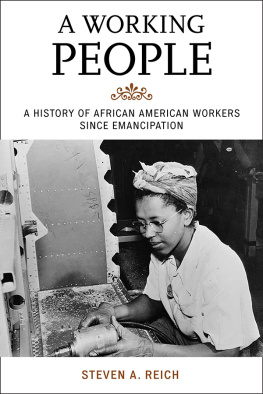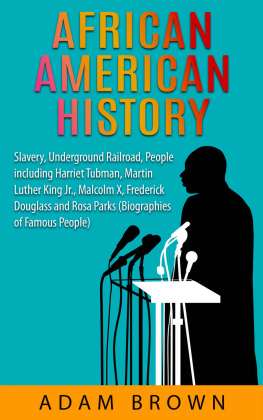A Working People
The African American History Series
Series Editors:
Jacqueline M. Moore, Austin College
Nina Mjagkij, Ball State University
Traditionally, history books tend to fall into two categories: books academics write for each other, and books written for popular audiences. Historians often claim that many of the popular authors do not have the proper training to interpret and evaluate the historical evidence. Yet popular audiences complain that most historical monographs are inaccessible because they are too narrow in scope or lack an engaging style. This series, which will take both chronological and thematic approaches to topics and individuals crucial to an understanding of the African American experience, is an attempt to address that problem. The books in this series, written in lively prose by established scholars, are aimed primarily at nonspecialists. They focus on topics in African American history that have broad significance and place them in their historical context. While presenting sophisticated interpretations based on primary sources and the latest scholarship, the authors tell their stories in a succinct manner, avoiding jargon and obscure language. They include selected documents that allow readers to judge the evidence for themselves and to evaluate the authors conclusions. Bridging the gap between popular and academic history, these books bring the African American story to life.
Volumes Published
Booker T. Washington, W.E.B. Du Bois, and the Struggle for Racial Uplift
Jacqueline M. Moore
Slavery in Colonial America, 16191776
Betty Wood
African Americans in the Jazz Age: A Decade of Struggle and Promise
Mark Robert Schneider
A. Philip Randolph: A Life in the Vanguard
Andrew E. Kersten
The African American Experience in Vietnam: Brothers in Arms
James Westheider
Bayard Rustin: American Dreamer
Jerald Podair
African Americans Confront Lynching: Strategies of Resistance
Christopher Waldrep
Lift Every Voice: The History of African-American Music
Burton W. Peretti
To Ask for an Equal Chance: African Americans in the Great Depression
Cheryl Lynn Greenberg
The African American Experience During World War II
Neil A. Wynn
Through the Storm, Through the Night: A History of African American Christianity
Paul Harvey
A Working People: A History of African American Workers since Emancipation
Steven A. Reich
A Working People
A History of African American Workers since Emancipation
Steven A. Reich
Rowman & Littlefield Publishers, inc.
Lanham Boulder New York Toronto Plymouth, UK
Published by Rowman & Littlefield Publishers, Inc.
A wholly owned subsidiary of The Rowman & Littlefield Publishing Group, Inc.
4501 Forbes Boulevard, Suite 200, Lanham, Maryland 20706
www.rowman.com
10 Thornbury Road, Plymouth PL6 7PP, United Kingdom
Copyright 2013 by Rowman & Littlefield
All rights reserved. No part of this book may be reproduced in any form or by any electronic or mechanical means, including information storage and retrieval systems, without written permission from the publisher, except by a reviewer who may quote passages in a review.
British Library Cataloguing in Publication Information Available
Library of Congress Cataloging-in-Publication Data
Reich, Steven A. (Steven Andrew), 1965
Working people : a history of African American workers since emancipation / Steven A. Reich.
pages cm. (The African American history series)
Includes bibliographical references and index.
ISBN 978-1-4422-0332-7 (cloth : alk. paper) ISBN 978-1-4422-0333-4 (ebook) 1. Working class African AmericansHistory. 2. African AmericansEmploymentHistory. 3. African AmericansCivil rightsHistory. 4. LaborUnited StatesHistory. I. Title.
HD8081.A65R45 2013
331.6396073dc23
2013018733
 The paper used in this publication meets the minimum requirements of American National Standard for Information SciencesPermanence of Paper for Printed Library Materials, ANSI/NISO Z39.48-1992.
The paper used in this publication meets the minimum requirements of American National Standard for Information SciencesPermanence of Paper for Printed Library Materials, ANSI/NISO Z39.48-1992.
Printed in the United States of America
Negroes are almost entirely a working people. There are pitifully few Negro millionaires and few Negro employers. Our needs are identical with labors needs: decent wages, fair working conditions, livable housing, old-age security, health and welfare measures, conditions in which families can grow, have education for their children, and respect in the community.
Martin Luther King Jr., AFL-CIO National Convention, Miami Beach, Florida, December 11, 1961

Contents

Chronology
1863: Emancipation Proclamation
1865: Confederate surrender, ending the Civil War; Thirteenth Amendment
1868: Fourteenth Amendment
1870: Fifteenth Amendment
1876: Strikes by black workers in the South Carolina rice fields; end of Reconstruction
1886: American Federation of Labor (AFL) founded
1887: Thibodaux Massacre and Louisiana Sugar War
1890: United Mine Workers of America (UMWA) founded; Mississippi State Constitutional Convention
1909: National Association for the Advancement of Colored People (NAACP) founded
19111913: Brotherhood of Timber Workers, campaign to organize black and white lumber workers in western Louisiana and southeastern Texas
1914: World War I begins in Europe; Marcus Garvey forms the Universal Negro Improvement Association (UNIA)
1916: Great Migration begins
1917: United States enters World War I
1918: End of World War I
1919: Red Summer of race riots; Great Steel Strike; 100 percent organizing drive Stockyards Labor Council
19201921: Postwar recession
1924: National Origins Quota Act, places heavy restrictions on European immigration
1925: Founding of the Brotherhood of Sleeping Car Porters (BSCP)
1929: Stock market crash; beginning of the Great Depression
1934: Founding of the Southern Tenant Farmers Union (STFU)
1935: The Committee for Industrial Organization (CIO) founded at the AFL annual convention; Congress passes the National Labor Relations Act
1936: Founding of the National Negro Conference (NNC); Steel Workers Organizing Committee (SWOC) launches its campaign to organize steelworkers
1937: BSCP wins labor contract with Pullman Company
1938: CIO breaks with the AFL and establishes itself as an independent labor federation, renamed the Congress of Industrial Organizations (CIO); Congress passes the Fair Labor Standards Act
1939: World War II begins in Europe
1941: United Automobile Workers (UAW) strike at Ford Motor Company; President Franklin D. Roosevelt issues Executive Order 8802, creating the Fair Employment Practice Committee; United States enters World War II
1943: Race riots in Mobile, Beaumont, and Detroit
1946: CIO launches Operation Dixie, its failed attempt to organize southern workers
1947: Congress passes the Taft-Hartley Act
1954: U.S. Supreme Court rules in Brown v. Board of Education
1955: The AFL and CIO merge, creating the AFL-CIO; Montgomery bus boycott begins
1960: Negro American Labor Council (NALC) founded
1962: President John F. Kennedy issues Executive Order 10988
1963: Civil rights marches in Birmingham, Alabama (April); Demonstrations in Philadelphia against employment discrimination in public construction jobs (AprilMay); March in Washington for Jobs and Freedom (August)












 The paper used in this publication meets the minimum requirements of American National Standard for Information SciencesPermanence of Paper for Printed Library Materials, ANSI/NISO Z39.48-1992.
The paper used in this publication meets the minimum requirements of American National Standard for Information SciencesPermanence of Paper for Printed Library Materials, ANSI/NISO Z39.48-1992.
